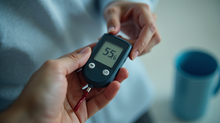Diabetes and dental health: What is the relationship between the two?
- Maureen Sullivan
- Oct 28, 2021
- 2 min read

Diabetes can be a difficult condition to manage because it is related to several other health conditions. People living with diabetes not only have to deal with the symptoms of their diabetes, but they also have to be aware of other potential health problems.
Dental health problems are one of the biggest issues that people with diabetes face, but many people are unsure how to deal with them. Here's everything you need to know about dental health problems and diabetes.
What Is The Link Between Diabetes and Dental Issues?
People with diabetes are at a much higher risk of developing gum disease. This is because the blood glucose levels in people who have diabetes tend to be more elevated than normal, and this can lead to significant changes in salivary composition. If your body's immune system cannot deal with these changes, you're going to end up experiencing tooth decay and gum disease.
What Are The Symptoms Of Dental Problems In People With Diabetes?
The first sign that you might have a serious dental problem is if you notice that your mouth feels sore or tender whenever you eat anything that requires chewing. At first, it'll feel like a dull ache but as time goes on, you may begin to experience sharp pain as well as bleeding gums. You should also be on the lookout for any unusual tongue or lip discoloration. If you have diabetes, you'll need to go for regular checkups at your family dentist more often than usual. This is because people with diabetes tend to develop dental problems much faster than people who don't have this condition. If you're not proactive about dealing with your dental issues, things will get progressively worse over time and you might end up needing to take out multiple teeth rather than one or two.
What Can I Do To Reduce The Risk Of Developing Dental Problems?
The best way to reduce the risk of developing gum disease when you have diabetes is by cleaning your mouth after every meal. Make sure that you brush and floss properly and use antibacterial mouthwash as well. It is also important to visit the dentist every 6 months for a checkup and cleaning, even if you don't have any noticeable problems at this time.
Changing your diet can also help you avoid gum disease. Avoiding sugary snacks and eating fewer carbs is always a good idea, but it might be even more important if you have diabetes. If you can cut back on foods that are likely to increase your risk of gum disease, it's much easier to manage.
Remember, prevention is the best cure here, so if you notice any changes to your teeth or gums, you should visit your dentist right away. If you catch it early, it is relatively easy to deal with gum disease. However, once it becomes advanced, it can cause some severe problems that are more difficult to treat.
If you have diabetes, it's important that you are prepared to deal with dental health issues.



































Comments